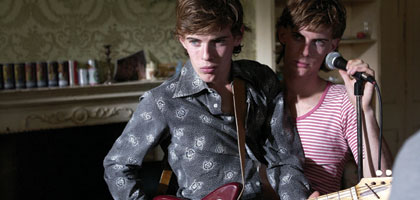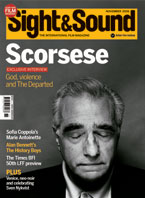Fabulous freak brothers
Film of the Month: Brothers of the Head

Nodding to Cronenberg and Tod Browning, this adaptation of a Brian Aldiss novel about a pair of conjoined-twin punk rockers promises much but just doesn't deliver enough filth or fury. By Mark Sinker
The basic idea of conjoined twins fronting a punk-rock band is surely strong. The band in Brothers of the Head has been manufactured, cynically, to exploit lead characters' Tom and Barry Howe's condition - but the film's faux-documentary form combines with the twins' passionate guilelessness to collapse the scam into a revealing authenticity. The film is based on a 1977 graphic novel by Brit sci-fi legend Brian Aldiss and artist Ian Pollock. Directors Keith Fulton and Louis Pepe are best known for their two 'making-of' Terry Gilliam documentaries: The Hamster Factor and Other Tales of 12 Monkeys (1997) and Lost in La Mancha (2001), the latter a chronicle of Gilliam's failure to make a Don Quixote movie. Brothers of the Head is posed as a retrospective documentary, interspersing supposed vérité footage of the original band-hype project with 'present-day' interviews of participants readdressing their roles in events.
The directors, along with Tony Grisoni, Gilliam's screenwriter on Tideland (2005) and Fear and Loathing in Las Vegas (1999), are certainly aware of the crosscurrents of possibility in their material. Interleaved with the action are flashes of a cultural history of the so-called monstrous, drawing on sources ranging from Tod Browning's 1932 film Freaks to Leslie A. Fiedler's similarly titled book of 1978, Freaks: Myths and Images of the Secret Self, an intelligent mapping of society's fascination with the tiny, the giant, the furred, the scaly, the limbless and the pinheaded. Cronenbergian riddles of individuality wink out at us: are we defined by our bodies or our minds; are the conjoined twins a single person, or two - or three, or more? A (fictional) documentary incorporating a (fictional) documentary, Brothers also turns a sardonic eye on the ethics of vérité and whether a documentarist should intervene if matters get out of hand. And, last but not least, this is a take on the much told tale of confrontational entertainment and its cooption by the forces it decries.
Fiedler's polemic (slightly belatedly) linked a 1960s counterculture micromovement - Freak Power, which embraced rejection as a mark of political strength - with the more complex contention that the pinheads and the dwarves and the bearded ladies had more control of their lives (and of social reaction to them) if they commodified themselves as carnival-troupe anomalies than if they subsumed themselves to a repressive middlebrow tolerance characterised by averted eyes and nervous silences. Hippies saw political action as a confrontational circus; later, punks viewed outcasts acting out as angry bearers of truth; both were obsessed with the medium as the message: the need to be seen to seize control of the stage, the camera, the studio, the song-writing, film-making or authorship process.
There are fruitful subtexts swirling around here, linking freak shows with old-time vaudeville, the entertainment industry with the commodification of confrontation. But these various microhistories bleed confusedly into one another and cancel each other out. For all its promise, Brothers becomes a trudge through unrealised ideas, and is strangely afraid of enjoying its own extremism, let alone its hypocrisy.
Probably the most likeable aspect of the film is music adviser Clive Langer's reconstruction of the exact pub-rock sound in 1974-75 - a squawky little madeleine for those of a certain age. But the twins never assert their own shape or voice. Despite the claims made for their band, the Bang Bang, by the massed talking heads, the Howes are denied the chance of creating a bit of history for themselves.
When it comes to anachronism, the bolder, the better. Would any social group in or near the mid-1970s rock world have boasted - to a man - such rigorously short proto-punk hair? Would a journalist on the edges of such a world state that she is researching "an academic publication about the exploitation of the physically impaired"? Langer's subtly informed ear for sound has not been matched by a style historian's eye. Punk's early look was
an unapologetic 'anti-cool' absurdity and awkwardness. Except that it then went on to win total victory over its predecessors, which means the anti-establishment look of 1974 is more or less visually irredeemable today.
For all the film's fancy gothic video and blurry soundtrack work, its style is a lot less 'show' than 'tell'. We are laboriously told that the twins were a shock to audiences, that they had a raw edge of danger, that there was an untapped volcano of anger… but they aren't, and they don't, and there isn't, really. Actors Harry and Luke Treadaway - who are identical twins, but not conjoined - are possibly a bit too successful in making their latex-applied condition seem utterly matter-of-fact. Similarly, the talking heads imply that the ménage à trois of the brothers with hop-in-bed hack Laura Ashworth evolved into a dangerous brew of desire, rage, fear, betrayal, jealousy and kinkiness - but onscreen it's rather meagre. Almost the sole moment of poignancy is a shot of the twins standing in the bath soaping one another, the undeniable eroticism of which is shadowed by a sense of the sheer mundanity of being forever linked to a sibling.
The faux-documentary style imposes a further double bind: it purports to cut in years of hindsight to help the exploration of a catastrophic event late in the story, but by also opting for a detective-thriller structure,
with the plot motor a prurient tug towards unspeakable mystery, it has to enforce a no-spoilers rule. Suspense turns to irritation the more guessable the outcome becomes. This kind of bad-faith posturing - with the sleuth-documentarist knowing the facts from the outset, but pretending not to - has become all too common in genuine factual television and cinema, and is as tiresome as it is dishonest.
Keen as it is to skewer the sins of its more corrupt characters, Brothers entirely overlooks its own double standards: it recruits the tough 'truth' of two lives trapped in one body as a shock-horror draw, then prissily denies itself the malevolent energy this could unleash. Indeed, its best idea is that corny old Ken Russell was hired to direct a Bang Bang biopic, Two-Way Romeo. Conjoining this film's high-end technique with Russell's anachronistic melodramatisation could have birthed a mutant style that let the underlying storygrow into itself; as things are, the narrative lurks beneath a too-knowing politesse. And if the film-makers wanted to chuck in a third, parasitic sibling within (a half-formed triplet possibly active within one of the brother's heads), as hamfisted symbol or as inexplicable Cronenbergian actuality, then it wasn't enough to have Russell, playing himself, pronounce the science-fictional idea a "wonderful metaphor for their genius", as if to half-pretend this element was merely the corpulent enfant terrible up to his usual crass fantasy tricks.
Look, punk made a business out of presenting its contradictions as its brashest, most unapologetic hooks: you don't hide the hypocrisy, you make a public spectacle of it. But, despite early flickers of self-reflexivity (and self-knowledge), the frame-breaking in Brothers of the Head is tucked safely back inside the story. Fulton and Pepe's hypocrisy is quietly effaced, whereas it should be highlighted, examined, in a word, exploited.


